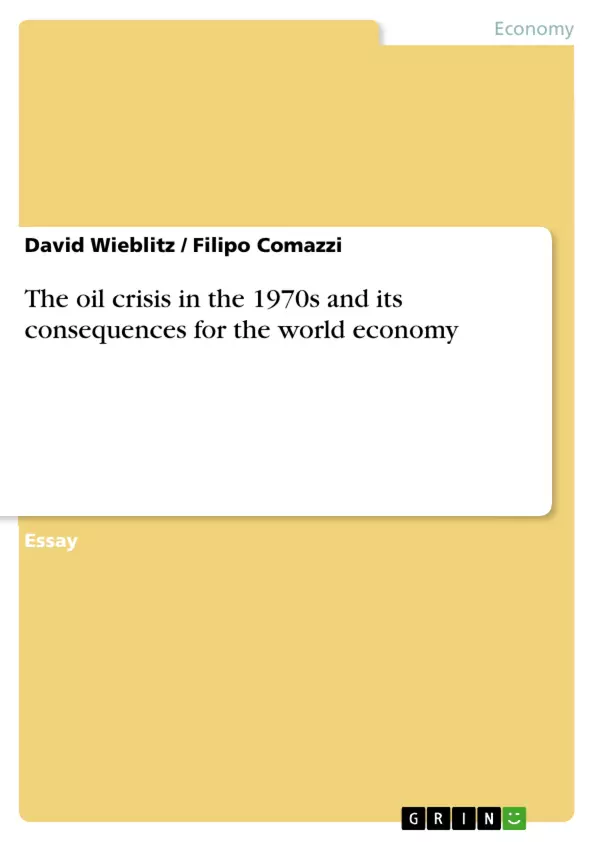Nowadays oil is still the world’s most important single source of energy. The world’s industry is influenced by the cost of energy which, in turn, is influenced by the price of crude oil, taxation and other factors. If the cost of energy goes up, then prices of goods and services will increase, subsequently it will cause lower availability of products, higher transportation’s costs and in turn lower economic growth. The latter will influence negatively the efficiency and productivity of the whole world’s industry. This means that if oil prices go too high or too low there will be unlikely consequences for both oil producers and oil consumers.
This paper analyzes the oil crisis of 1970ies.
The first section concerns the history of the October War (6 – 23 October 1973) that led to the oil embargo, one of the most dramatic events for the world economy. The embargo lasted six months, beginning on 17 October 1973 and ending on 18 March 1974. The second section deals with the impact of the energy crisis on different countries. It caused terrible consequences for the economies of all industrialized countries such as recession, inflation, unemployment, lost economic growth and stagflation. But the essential question is whether the energy crisis was a real shortage or mainly a matter of politics.
Inhaltsverzeichnis (Table of Contents)
- I SECTION
- The historical background
- The "energy crisis" began to emerge
- II SECTION
- The main elements of the embargo
- The consequences on the world economy
- Who was responsible
Zielsetzung und Themenschwerpunkte (Objectives and Key Themes)
This seminar paper analyzes the oil crisis of the 1970s, focusing on the historical context, the consequences of the energy crisis, and the responsibility for its emergence. The paper delves into the events leading to the October War, the resulting oil embargo, and the impact of this crisis on various economies.
- The political motivations behind the oil embargo by Middle Eastern oil-producing countries
- The economic consequences of the oil crisis on industrialized nations
- The dynamics of the international oil market during the 1970s
- The role of OPEC in the global energy landscape
- The relationship between oil prices and economic growth
Zusammenfassung der Kapitel (Chapter Summaries)
- I SECTION
- The historical background examines the evolution of oil as a primary energy source, focusing on the growing dependence of industrialized nations on oil imports, particularly from Middle Eastern countries. It outlines the political context, specifically the power dynamics between oil-producing nations and Western companies, and the emerging need for greater control over this resource.
- The "energy crisis" began to emerge delves into the increasing demand for oil, driven by economic growth, and the resulting tight supply-demand equation. This section explores the emergence of the phrase “energy crisis” in the context of the American political vocabulary, the growing gap between demand and supply, and the efforts by oil-producing countries to establish their own national oil companies and expertise.
- II SECTION
- The main elements of the embargo focuses on the impact of the energy crisis on different countries, highlighting the economic consequences, such as recession, inflation, unemployment, and stagflation, experienced by industrialized nations. This section investigates the question of whether the crisis was truly a shortage or primarily a political maneuver.
Schlüsselwörter (Keywords)
The key themes and concepts explored in this seminar paper include the oil crisis of the 1970s, the October War, the oil embargo, OPEC, the global energy market, economic growth, recession, inflation, unemployment, and stagflation. The paper examines the complex interplay between political power, economic dependence, and resource control, and its impact on the global economy.
Frequently Asked Questions
What caused the oil crisis of the 1970s?
The crisis was triggered by the October War (Yom Kippur War) in 1973, leading to an oil embargo by Arab producers against countries supporting Israel.
How long did the 1973 oil embargo last?
The embargo lasted approximately six months, beginning on October 17, 1973, and ending on March 18, 1974.
What were the economic consequences for industrialized nations?
The crisis led to severe recession, high inflation, increased unemployment, and the emergence of "stagflation" (stagnant growth combined with inflation).
Was the energy crisis a real shortage or political?
The paper investigates whether the crisis was a physical lack of resources or primarily a political maneuver by OPEC countries to gain control over oil prices and influence global politics.
What role did OPEC play in this era?
OPEC emerged as a powerful global actor, allowing oil-producing nations to establish national oil companies and challenge the dominance of Western energy corporations.
- Citar trabajo
- David Wieblitz (Autor), Filipo Comazzi (Autor), 2004, The oil crisis in the 1970s and its consequences for the world economy, Múnich, GRIN Verlag, https://www.grin.com/document/58349



